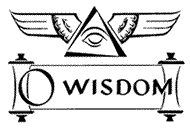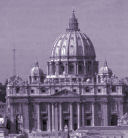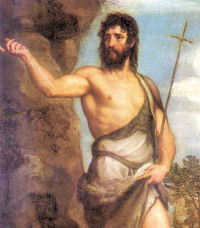Advent: December 17th
Third Sunday of Advent
Other Titles: Day 1 O Antiphons: O Sapientia (O Wisdom)
Free eBook:

|
| Free eBook: Liturgical Year 2023-2024, Vol. 4 |
» Enjoy our Liturgical Seasons series of e-books!
"Rejoice: the Lord is nigh." As Christmas draws near, the Church emphasizes the joy which should be in our hearts over all that the birth of our Savior means for us. The great joy of Christians is to see the day drawing nigh when the Lord will come again in His glory to lead them into His kingdom. The oft-repeated Veni ("Come") of Advent is an echo not only of the prophets but also of the conclusion of the Apocalypse of St. John: "Come, Lord Jesus," the last words of the New Testament.
Today is known as Gaudete Sunday. The term Gaudete refers to the first word of the Entrance Antiphon, "Rejoice". Rose vestments are worn to emphasize our joy that Christmas is near, and we also light the rose candle on our Advent wreath.
December 17 marks the beginning of the O Antiphons, the seven jewels of our liturgy, dating back to the fourth century, one for each day until Christmas Eve. These antiphons address Christ with seven magnificent Messianic titles, based on the Old Testament prophecies and types of Christ. The Church recalls the variety of the ills of man before the coming of the Redeemer.

1st O Antiphon: Who hast issued from the mouth of the Most High, Reaching from end even unto end, Ordering all things indomitably yet tenderly, COME
|
Divine Wisdom clothes itself in the nature of a man. It conceals itself in the weakness of a child. It chooses for itself infancy, poverty, obedience, subjection, obscurity. "I will destroy the wisdom of the wise and the prudence of the prudent I will reject. . . . Hath not God made foolish the wisdom of this world? For seeing that in the wisdom of God the world by wisdom knew not God, it pleased God, by the foolishness of our preaching, to save them that believe. For both the Jews require signs, and the Greeks seek after wisdom; but we preach Christ crucified, unto the Jews, indeed, a stumbling block, and unto the Gentiles foolishness; but unto them that are called, both Jews and Greeks, Christ, the power of God and the wisdom of God. . . . But the foolish things of the world hath God chosen, that He may confound the wise; and the weak things of the world hath God chosen, that He may confound the strong. And the base things of the world and the things that are contemptible, hath God chosen, and the things that are not, that He might bring to naught the things that are" (I Cor. 1:19 ff.).
- Come, O divine Wisdom, teach us the way of knowledge. We are unwise; we judge and speak according to the vain standards of the world, which is foolishness in the eyes of God.
- Come, O divine Wisdom, give us the true knowledge and the taste for what is eternal and divine. Inspire us with a thirst for God's holy will, help us seek God's guidance and direction, enlighten us in the teachings of the holy gospel, make us submissive to Thy holy Church. Strengthen us in the forgetfulness of self, and help us to resign ourselves to a position of obscurity if that be Thy holy will. Detach our hearts from resurgent pride. Give us wisdom that we may understand that "but one thing is necessary" (Luke 10:42). "For what doth it profit a man if he gain the whole world and suffer the loss of his own soul?" (Matt. 16:26.) The Holy Spirit would have us know that one degree of grace is worth more than all worldly possessions.
|
Today is Day Two of the Christmas Novena. |
 Third Sunday of Advent, Guadete Sunday
Third Sunday of Advent, Guadete Sunday
Station with San Pietro in Vaticano (St. Peter's in the Vatican):
The Station is at St. Peter's in the Vatican. After the two great basilicas chosen for the first and for the second Sunday in Advent, we come to St. Peter's in the Vatican, a church which shares with the Lateran the chief feasts of the year. It was selected as the station for today, because on this Sunday occurred the final scrutiny or examination of those candidates preparing for the Ordinations usually held on Ember Saturday in December. The original basilica was built by Constantine in 323 over the place where St. Peter was buried.
For more on San Pietro in Vaticano, see:
For further information on the Station Churches, see The Stational Church.







